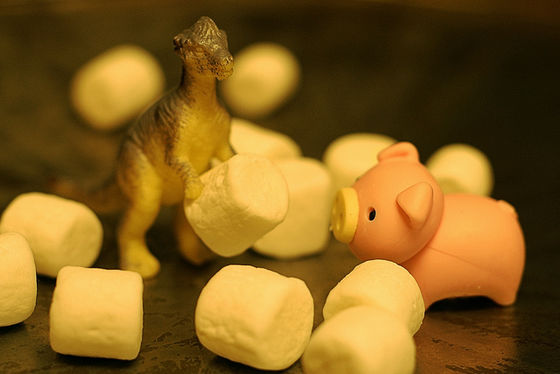What is necessary for "Children to succeed in society in the future"?

ByWill Folsom
The most famous test among the experiments in the behavioral sciences, which showed that children with self-discipline who suppresses desire were more likely to succeed society in the future,Marshmallow Experiment(Marshmallow · test) ". Psychologist Walter Michel took up psychology related topics that new research revealed the idea necessary to remake this experiment which was conducted at Stanford University from the 1960s to the 1970s to betterPsychology TodayIt introduces.
The Marshmallow Myth | Psychology Today
https://www.psychologytoday.com/blog/strategic-thinking/201703/the-marshmallow-myth
Call a 4-year-old child in a desk and chair-only room where there is nothing distracting, just put one delicious marshmallow in front of you, "I will eat marshmallows for 15 minutes till I come back I will give another marshmallow, if I eat marshmallows before returning, I will not give the second one. "It is the" Marshmallow Experiment "to observe whether the child can endure eating marshmallows .
As a result of this experiment, it seems that about one third of the children who could endure without eating marshmallows and get the second marshmallow. Furthermore, as a result of follow-up surveillance after that, the child who was able to have self-control for the second marshmallow (future remuneration) at the age of 4 years before preschool was evaluated as "excellent" at the school thereafter The number is relatively large,University admission test(SAT) score was found to be 210 points higher than the group that ate the marshmallows. Furthermore, the strength of this self-control is known to last throughout the life. In other words, it turns out that those who have self-control in their childhood have a high possibility of having social success in the future.

ByMark Bonica
A research result suitable for remaking such a marshmallow experiment is the National Center for Biotechnology Information in the United States of AmericaNCBIIt was made public.research resultIt was published by the researchers at the University of Chicago, Mr. Caitlin Wooly and Mr. Elette Fischbach. According to it, according to this, it is said that acts (immediate remuneration) that can achieve results as soon as " Is said to be a stronger factor of sustainability than actions (delayed compensation) that take time to obtain results such as "improvement of health". Also, while immediate remuneration is involved in the sustainability of "study" and "exercise", delayed compensation is the reason for doing so.
In other words, delayed compensation is a motivation for setting long-term goals and "engaging in long-term goals", and immediate remuneration is strongly related to sustainability to achieve long-term goals. As for what this means, when doing jogging with the goal "to lose weight" for "wearing slender pants (delayed reward)", find a jogging partner who likes to talk, instead of joggingZumbahIt is important for us to sustain the long-term goal to interweave "fun act (immediate remuneration)" in the process of achieving the goal of "thinning" by challenging .

ByJohn Benson
The marshmallows were able to endure the temptation of the marshmallows by the children who succeeded in distracting by distracting eyes or doing other things from the marshmallows in front of them. As for how the children distracted, it seems necessary to sel a song or play a game in the head, so it is necessary to strongly regulate yourself, such as "wait in marshmallow" I did not do anything. Up to now it was thought that children who tolerated marshmallows were "children able to rule themselves for greater future rewards", but when looking at the results of this research together, "delayed reward (marshmallow You can also think of "immediate remuneration (singing a song or playing a game in your head)" between for "to get 2 pieces".
In other words, those who are judged to be "socially successful" in the marshmallow experiment are not "people who can stand now for future success" but "people who can find satisfaction (immediate remuneration) in every situation" Psychology Today wrote that it is. Although it can be seen as a small difference, if it is said that it is important to find "fine fun" rather than "to abandon small and take big", the mental impression should be quite different as a practitioner.
The book "Marshmallow Test: Successful Children / Not a Child" by Psychologist Psychologist who invented the Marshmallow Experiment is sold on Amazon.co.jp, Kindle version is 1847 yen, Tutor book is 2052 It is yen.
Marshmallow Test: Successful Children / No Child | Walter Michel, Shibata Hiroyuki | Books | mail order | Amazon

Related Posts:
in Science, Posted by logu_ii







